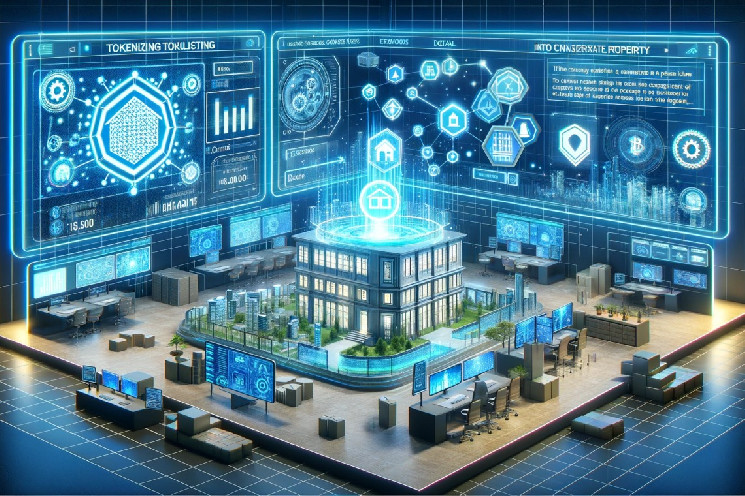The RWA (Real World Assets) tokens are transforming the way traditional assets are financed, managed, and traded, combining the world of traditional finance with the emerging world of blockchain technologies: here are the best ones of the moment.
These tokens represent tangible or intangible assets from the real world, such as real estate, works of art, precious metals or even financial credits, and make them tradable on blockchain-based platforms.
The tokenization of RWAs promises to increase liquidity, reduce transaction costs, and make investments accessible to a wider audience.
Summary
What is an RWA Token?
A RWA token is a digital token that represents ownership or an interest in a real-world asset.
These tokens are generally issued on blockchains like Ethereum, and can adhere to tokenization standards such as ERC-20 or ERC-721, which are respectively for fungible and non-fungible tokens.
The basic idea is to tie the value of the token to that of the underlying real asset, thus offering transparency, security, and immutability thanks to blockchain technology.
Advantages of RWA Tokens
- Liquidity: RWA tokens can be traded on secondary markets, increasing the liquidity of assets that are traditionally considered illiquid.
- Accessibility: They break down barriers to entry for investors, allowing the purchase of fractions of expensive assets.
- Efficiency: They reduce the time and costs associated with the management and transfer of real assets.
- Transparency: The blockchain provides an immutable record of all transactions, increasing transparency and reducing the risk of fraud.
The Best Types of RWA Tokens
Analysing the best RWA tokens in circulation requires careful consideration of several factors, including the quality of the underlying asset, the stability of the project, legal compliance, and token liquidity. Below are some of the RWA tokens that are emerging as leaders in the industry:
- Real Estate Investment Tokens: Platforms like RealT and Harbor have launched tokens that represent ownership stakes in real estate properties. These tokens allow investors to earn rental income and benefit from the appreciation of property values.
- Precious Metals Token: Projects like Paxos Gold (PAXG) offer tokens that represent physical gold stored in secure vaults. Investors can purchase fractions of a gold bar, with the security of full coverage and certification of authenticity.
- Debit and Credit Tokens: Platforms like Centrifuge and Tinlake allow for the tokenization of commercial credits and loans. These tokens represent rights to cash flows derived from loans or invoices, offering investors a stable and predictable return.
- Art Tokens: Artory and Maecenas are examples of platforms that allow the tokenization of works of art. This allows investors to purchase shares of famous paintings or sculptures, making the art market more accessible and liquid.
The best tokens of RWA projects in circulation
In addition to the projects already mentioned, there are other interesting initiatives in the field of RWA tokens that deserve attention, such as Ondo, Maker, Pendle, and Parcl.
- Ondo is a platform that facilitates the creation of decentralized investment funds, allowing investors to diversify their portfolios through the tokenization of various asset classes. Ondo aims to break down traditional barriers to asset management, offering innovative solutions for decentralized finance (DeFi).
- Maker, known for its stablecoin DAI, is further exploring the use of RWA as collateral in its lending system, allowing to increase the stability and adaptability of its ecosystem.
- Pendle offers a platform that allows trading of future yields of yield tokens, providing users with more flexible ways to manage the risk and return of DeFi investments.
- Parcl is particularly intriguing; it aims to tokenize specific real estate locations on Solana, allowing investors to speculate on real estate price movements in different geographical areas. The imminent launch of their token adds an additional layer of excitement for investors interested in the decentralized real estate sector.
Investing in RWA tokens involves significant legal and regulatory considerations. Regulators in various countries are still working to understand and properly regulate this new class of assets.
Before investing, it is essential to verify the token’s compliance with local and international regulations, including anti-money laundering (AML) legislation and know your customer (KYC) regulations.
Conclusion
The RWA tokens represent an innovative frontier in the world of investments, offering unique opportunities but also significant challenges.
As the sector continues to evolve, the growth of tokenization of real assets could have profound implications for global finance, making investments more democratic and accessible.
Before proceeding, however, it is essential to make a careful assessment of the risk, considering both market prospects and the regulatory framework.
 en.cryptonomist.ch
en.cryptonomist.ch
